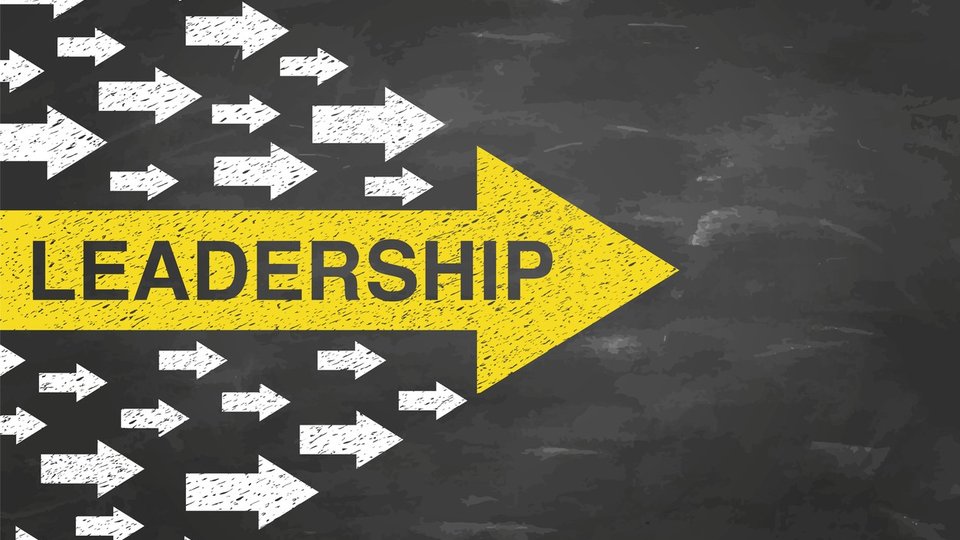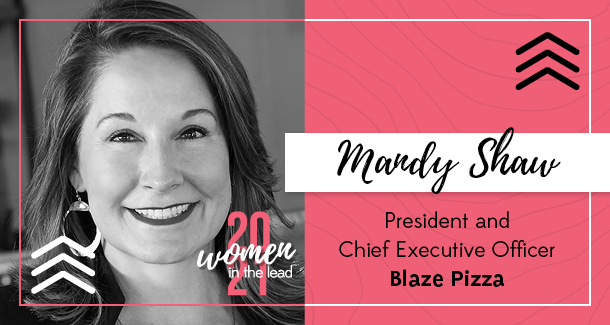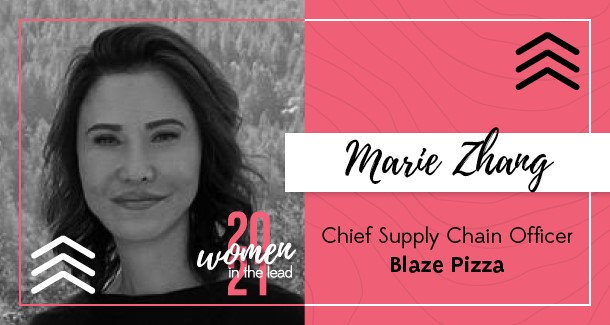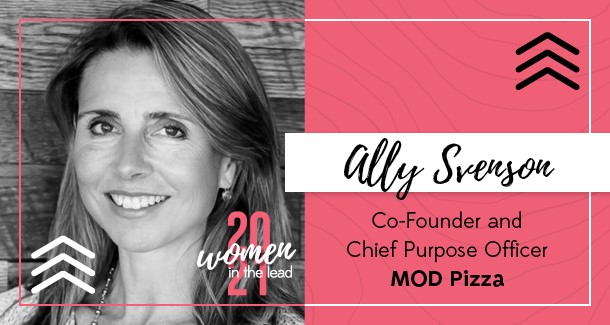Staffing
Women of the pie: 3 pizza industry leaders relay lessons learned
The road to the top in the pizza restaurant industry can be a rough one for professional women, but these three leaders show not only that it can be done, but done well and with a sense of responsibility to the women coming up behind them.

March 10, 2021
Like so many things in the culinary world, pizza has had a reputation for being a product put forth mostly by men. Perhaps that's why the pizza restaurant segment took so long for women to enter in any meaningful way. The good news is though that, like the smoke from a perfectly stoked pizza oven, those days are fading away. Women are taking the reins of some of the leading brands vying for the customer's share of stomach today.
Three such women have been profiled this week by the editor of our sister site, Fastcasual.com, Cherryh Cansler, as part of her International Women's Day series on female leaders across the restaurant space. Their prominence with their brands and across the still largely male-dominated industry is proof that the pie is definitely turning to show more of its feminine side. And what we learned when we spoke with these three women executives is that fact alone is making the entire segment better because of their presence.
Below, we've pulled out the three profiles of pizza's professional women for the readers of Pizza Marketplace, but please check out all the women profiled in the first and second parts of Cansler's series.
Blaze Pizza President and CEO Mandy Shaw

Q. How did you get your start in the restaurant business?
A. Early in my career I was an auditor with clients in media and entertainment, technology and restaurants. When my son was 2 years old, I was ready for a lifestyle and career change and went to work for one of my clients, Outback Steakhouse Inc., which is today called Bloomin' Brands (the parent company of Outback, Carrabba's Italian Grill, Fleming's Prime Steakhouse & Wine Bar, Bonefish Grill and other concepts). I started as the lead in external financial reporting, and in over 13 years, I progressed to chief accounting officer. As my career continued, I later became chief information officer, and my last role was the chief financial officer for the international division of the company.
Q. Do you believe — as many female leaders have stated — that often women impede the progress of other women's advancement? How do you personally address that in your life?
A. I don't believe that women "often" impede the progress of other women, and there are plenty of advocates or people who don't consider gender when evaluating talent. Unfortunately, sometimes there are misogynistic women in the workplace. I wasn't sure that I believed it until I encountered it myself the first time and have seen it since. The unfortunate outcome of this occasionally being true is that it gives others the permission to trivialize real disconnects. Statements like, "Oh, you don't work well with her? It must be because women can't work together" are the kind of generalizations that are really unhelpful.
When I have encountered women that seem insecure or threatened, I addressed it head on. I met with the person and talked about where any conflict may stem from and sincerely worked towards addressing anything that caused friction. It's really the same toolkit you use to address any relationships in the workplace that aren't as successful as you'd like. Meet with the person one-on-one and explain that it's unhealthy for the team dynamic as well as another obstacle in the way of all women achieving more success. Thus, it becomes something that really has to be dealt with. Ultimately, if you work for someone, man or woman, who is intent on undermining you, taking credit for your achievements or just getting in the way of your progression, you have to move on!
Q. Can you discuss a time when you were underestimated or discriminated against because of your gender? What did you do? What did you learn from that incident?
A. I have been working for nearly 30 years, so the short answer is a hard yes. It ranges from the inane, like my first job out of college and not being allowed to wear pants in the workplace, to walking into the reception area to meet a board member who was expecting me, and yet he still assumed I was the administrative assistant. Examples of discrimination are hard to talk about, because there is always fear of being labeled "the crazy feminist" and being discounted by men as a result, but we have to or things won't continue to change.
I remember an international assignment when I was putting together a significant development deal and was so excited about the progress we were making. At the close of the last meeting, the potential partner asked for my personal cell number, and I really didn't think twice about it. When he shortly thereafter started sending inappropriate texts and phone calls, I was stunned. Really the worst part was that it nearly completely erased the professional satisfaction that I had walking away from the meetings.
I told several people in the organization, including human resources, but was told there wasn't really anything we could do because he was a business partner of ours. From that, I learned to create my own boundaries and definitions of what I would tolerate, to communicate them clearly and not just go along with something that made me uncomfortable just to avoid making others uncomfortable. Too often, women don't speak up because we're supposed to just put up with it. Don't.
Q. How do you ensure that your voice is heard and/or that you receive credit and compensation for your contributions?
A. I think really, for women, people of color, or anyone whose peers don't look like them, there is a tendency for leadership to say you're asking for too much. They'll point out, "Look at all you've accomplished, isn't that enough? You're already so far ahead of other women," instead of "How do we get you to the next level?" What this means is that if you don't self-advocate, you likely won't receive credit or compensation at the appropriate levels. There have been many times in my career (particularly because I achieved certain levels of success at a younger age than may be typical) that I had to assess what the market was for my position, or the financial benefit that was a result of my contributions and schedule a meeting to sit down with my boss and have an unemotional, fact-based talk about it.
The biggest lesson I learned years ago is that no one but you really sees how many hours you're putting in (a lot, sure, but do they know you haven't had a day off in three months?), the list of your accomplishments, or the achievements that you've brought to the organization. By the end of any year, I would forget much of what I'd done because I tend to keep looking forward, so keep a list! Include other things you've done to make a better workplace, like establishing a relationship with the National Association of Black Accountants to attract more diverse candidates, or creating the first mother's room so women had a place to pump after returning from maternity leave.
Put numbers against your business contributions, including how much revenue was generated, cost savings that were achieved, time that was saved. Lastly, be persistent. I've been told no plenty of times in my career. I ask for the reasons why…is it the lack of education, experience, or what? And then walk away and evaluate whether you agree. If you do? Go get the thing that's missing. And if you don't? Politely go back and ask again with your perspective on why you do meet the criteria. Ask to be given a shot at it and give them your plan on how you'll overcome anything that is a concern.
Q. If you have a daughter (and especially if you have a son) what do you want them to take away from your career position about the value of female leaders?
A. I have a 19-year-old son and a 15-year-old daughter. I told them I was being interviewed and asked if they felt my career had any sort of impact on them. After I got the eyerolls, they both answered with the equivalent of a resounding "duh" and provided me with their impressions. My daughter knows that to have choices in life, she may have to choose a different path to ensure the success that she desires. She also knows that she may have to fight a little harder to get it because she's a woman.
They've both watched me progress and heard me talk at the dinner table about my career and life as a single mom for the past decade. They've listened to my stories of success of the people who have worked for me and the missteps I thought perhaps others were making or also my own. My son, in particular, made note of me making him uncomfortable telling him stories of sexual harassment, but quickly acknowledged that he understood why I did.
I have always been very open as a parent about what real life looks like, and although we have a ton of fun, heavy topics are fair game in our house. So, when asked what my son takes away, he said he's proud of me and that he knows the sacrifices and hard work that it has taken to come completely on my own from a modest beginning to the position I hold today. What I hope he knows as he is beginning his own career, is that strong leaders are also compassionate, team-oriented, and value diversity. There is unparalleled strength in the combination of different backgrounds, viewpoints and perspectives. And if I don't see it, he'll be hearing from his mom!
Blaze Pizza Chief Supply Chain Officer Marie Zhang

Q. How did you get your start in the restaurant business?
A. After I graduated from college with two Master's degrees in Chemistry and Food Science, I led research and development and quality assurance for a Chicago manufacturer that produces meat proteins, including spiral sliced hams for HoneyBaked Ham Company. My efforts and dedication to support the HoneyBaked Ham growth later led me to the amazing opportunity to join HoneyBaked Ham company in Atlanta to oversee their supply chain division for about seven years. After my time at HoneyBaked Ham, I spent three years at YUM Brands as their chief supply chain officer, which eventually steered me to lead the global supply chain for FOCUS Brands for five years. I've been leading supply chain in the restaurant business for 16 years now and am eager to bring my industry expertise to the Blaze team.
Q. Do you believe — as many female leaders have stated — that often women impede the progress of other women's advancement? How do you personally address that in your life?
A.While I'm cognizant that these incidents happen in the industry, I'm lucky to say that I have never experienced this in my career. I have worked with 13 different Presidents and CEOs, two of which were females. My first female boss, Kat Cole, president and COO of FOCUS brands, and my current boss Mandy Shaw, president and CEO of Blaze Pizza, have always supported me and had my best interest at heart. They've been amazing leaders who have been big contributors to my personal growth, and I feel very blessed for this experience.
Q. Can you discuss a time when you were underestimated or discriminated against because of your gender? What did you do? What did you learn from that incident?
A. I'm blessed to say that this is not something I've had to experience throughout my career. I'm a hard worker and deliver great results, which have always been appreciated by my colleagues and upper management.
Q. How do you ensure that your voice is heard and/or that you receive credit and compensation for your contributions?
A. Many times in the workplace, it's challenging for women to have their voice heard and receive credit for their accomplishments. It can be especially tough for women to receive recognition in the form of compensation in comparison to their male colleagues.
The first thing I would say to ensure your voice is heard is to come prepared. When you're getting ready for a meeting, know who is there, what will be discussed, prepare your talking points and questions, and plan for each meeting to the best of your ability. This will help you gain the confidence to speak up during a presentation or conference, which leads me to my second point. Don't be afraid to chime in! If you feel your voice isn't being heard, then use your voice to convey your thoughts or ideas. This can be harder for women, so take a few minutes to put your thoughts together and deliver with confidence. Delivery is key when speaking up. It's important to be confident, however, don't be defensive.
To establish yourself as a valuable asset to the team, build your credit. If you have the opportunity to take the lead on a project, do your best to deliver quality work. Once people know your capabilities, they will trust in your work and appreciate your achievements. Trust in what you know and be open with others, as people respect knowledge and will come to you when needing insight on your expertise.
Additionally, let others know your achievements. When there is an opportunity to share your contributions (team meetings, reviews, etc.), share what you have done to make a project or initiative successful. An essential way to ensure you get credit for your accomplishments is to voice your value to the company, and as you establish your credit in the workplace, ask your boss to take ownership of projects where you can excel. Get out of your comfort zone, take ownership of these projects, and deliver the best you can. Taking these steps will help your voice be heard and feel valued for your contributions.
Lastly, it's also important to remember that compensations were cut across many business due to the pandemic, so it can be hard right now for both males and females to feel valued for their work. Be patient and trust in your value, as your hard work will shine through soon!
Q. If you have a daughter (and especially if you have a son) what do you want them to take away from your career position about the value of female leaders?
A. I have two daughters; I constantly encourage them to believe that anything is possible. You can do anything you set your mind to, and it's okay to fail along the way. Have confidence in yourself and what you want to accomplish – that will help reach your full potential.
Mod Pizza cofounder and Chief Purpose Officer Ally Svenson

Q. How did you get your start in the restaurant business?
A:Scott (my husband) and I were living and working in London when we launched Seattle Coffee Company in 1994. We opened our first location in Covent Garden, introducing the UK to the Seattle's coffee bar culture. After several months, three new locations and one baby, Scott left his career in finance to join me in the company full-time. Together, we built Seattle Coffee Company to 75 retail locations in under three years, and in 1998 we sold the business to Starbucks — giving the coffee giant its entry into the UK and Europe.
While we never intended to enter the world of entrepreneurship, we were driven by our desire to fill a glaring need, which in our case was the double tall lattes that we knew and loved from our hometown of Seattle. Following the sale of Seattle Coffee Company, we went on to help grow Carluccio's, a London-based Italian deli concept, which went public in London in 2005 and was the top AIM listing of the year.
Truth be told, we really had no intention of starting another business, but sometimes a need and opportunity is so clear that you can't ignore it — and MOD was one of those times. Scott and I were raising our four growing boys, and like many busy families, were often shuttling between various activities with a car full of hungry kids. We saw a need for quick, affordable, and healthy and fun dining options, and we became inspired to offer pizza in a new way.
Q. Do you believe – as many female leaders have stated – that often women impede the progress of other women's advancement? How do you personally address that in your life?
A. While I haven't experienced this directly, I'd be naïve if I said it didn't exist. But I do find it totally unfortunate and certainly, for women, a massively missed opportunity! When women collaborate, support, and build each up, extraordinary things can happen and inevitably everyone can benefit. I believe this so strong and have always agreed with Madeleine Albright's statement that "there is a special place in hell for women who don't help other women."
I'm so lucky to have been exposed to so many amazing female role models who have impacted my career and life on many levels. I now work hard to try and provide inspiration and support to all of the women in my life – at MOD and beyond.
Not long ago, I heard Melinda Gates speak to a group of middle school girls. Although she sits on a huge world stage, helping to solve some of our biggest problems, I was so inspired to see her take time to connect with this small group of local girls. It was a great reminder that often times it's the small moments that can end up providing the seed for larger impacts.
Q. How do you ensure that your voice is heard and/or that you receive credit and compensation for your contributions?
A.Scott and I have the Harry S. Truman quote hanging in our office, "It is amazing what you can accomplish if you do not care who gets the credit." We've tried to practice this wisdom while building MOD.
MOD exists to serve people, starting with our employees (the MOD Squad) and then our customers and communities. As a servant-leader, I believe that I exist to be of service to the MOD Squad. We've learned that when we are truly in service to our employees, they are inspired to serve our customers, and MOD will continue to grow and thrive.
We have always measured MOD's success not by the number of stores we open, but by the number of people we can positively impact. My job is to keep this front of mind, and to continue to do what I can to engage and inspire as many people as possible.
Q. If you have a daughter (and especially if you have a son) what do you want them to take away from your career position about the value of female leaders?
A.Scott and I have four sons and it's been really valuable for them to see that we're equal partners in the business and in life. I'm grateful to say that I believe our boys fully appreciate and expect that women are meaningful and powerful contributors to the world, worthy of great respect.
 ChatGPT
ChatGPT Grok
Grok Perplexity
Perplexity Claude
Claude








